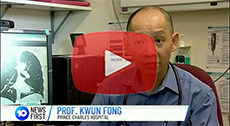International Lung Screen Trial (ILST)
Lung cancer kills more people than any other cancer in the world. This is often because the symptoms of lung cancer are not always apparent until the cancer is advanced and hence more difficult to cure. As with breast and bowel cancer, screening (looking for lung cancer in people who do not have obvious symptoms) can reduce mortality. This is because smaller cancers can be detected at an earlier stage when they are easier to treat. Lung cancer screening is done using non-contrast computed tomography (CT) scans.
The International Lung Screen Trial (ILST) is building on previous studies to test ways to increase the effectiveness of lung screening. ILST is recruiting healthy, asymptomatic volunteers at high risk of lung cancer in Australia, Canada and Hong Kong.
All those interested in participating will be assessed for eligibility by the research team. Eligible individuals will have a screening CT scan at baseline and another screening CT scan after two years to look for lung nodules. If a screening CT shows a lung nodule, it may not be cancer but could need further assessment.
ILST participants must meet the following eligibility criteria:
- Current smoker or former smoker
- Aged from 55 to 80
- In good general health
If all three criteria apply to you, you may be eligible to participate in ILST conducted at various international sites.
Newsletters
In the news
Researchers working on screening method to choke off lung cancer (Brisbane Times. 28 February 2019)
International Lung Screen Trial (ILST)
Lung cancer kills more people than any other cancer in the world. This is often because the symptoms of lung cancer are not always apparent until the cancer is advanced and hence more difficult to cure. As with breast and bowel cancer, screening (looking for lung cancer in people who do not have obvious symptoms) can reduce mortality. This is because smaller cancers can be detected at an earlier stage when they are easier to treat. Lung cancer screening is done using non-contrast computed tomography (CT) scans.
The International Lung Screen Trial (ILST) is building on previous studies to test ways to increase the effectiveness of lung screening. ILST is recruiting healthy, asymptomatic volunteers at high risk of lung cancer in Australia, Canada and Hong Kong.
All those interested in participating will be assessed for eligibility by the research team. Eligible individuals will have a screening CT scan at baseline and another screening CT scan after two years to look for lung nodules. If a screening CT shows a lung nodule, it may not be cancer but could need further assessment.
ILST participants must meet the following eligibility criteria:
- Current smoker or former smoker
- Aged from 55 to 80
- In good general health
If all three criteria apply to you, you may be eligible to participate in ILST conducted at various international sites.
How can you apply?
There are several ways you can contact us, please see the details below, based on your location. We will need detailed health and smoking history to determine if you are eligible for this study. The questionnaires can be done on paper or electronically.
ILST Sites
Testimonials
I would thoroughly recommend participating in this survey. My wife read about it and strongly suggested I put my name down. I was a heavy smoker for over fifty years and to the best of my knowledge I never had any obvious symptoms apart from the odd cough. I exercised regularly and generally felt in good health.
However the scans showed I had a growing cancer in my right lung which required a lobectomy and a smaller one in my left which later required removal. Without enrolling in this survey, it may well have been too late. Obviously, I don’t know whether the cancer will return but at least the survey provided early diagnosis and at the very least gave me a fighting chance.
Michael Beatty Age 69
Several patients have had incidental findings, while CT screening for lung cancer as part of this study. One of those patients had a large mass on their left adrenal gland. It was removed via key hole surgery. They wrote:
“Am very grateful to the ILST that this (adrenal mass) was discovered. Admittedly it may never have caused issues but it was rather large and if it kept growing it would have eventually impacted on other organs and needed to be removed by open surgery.”

